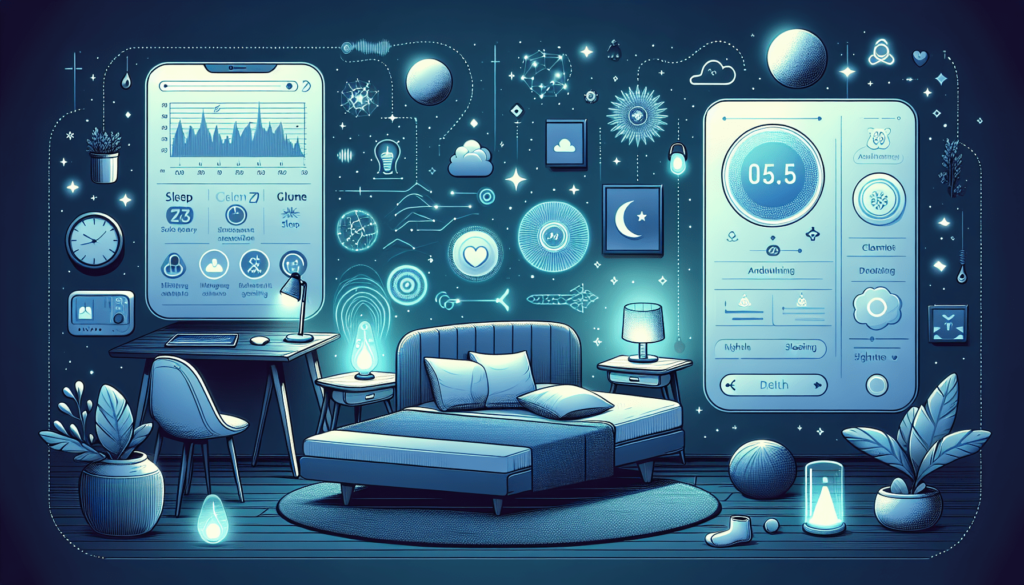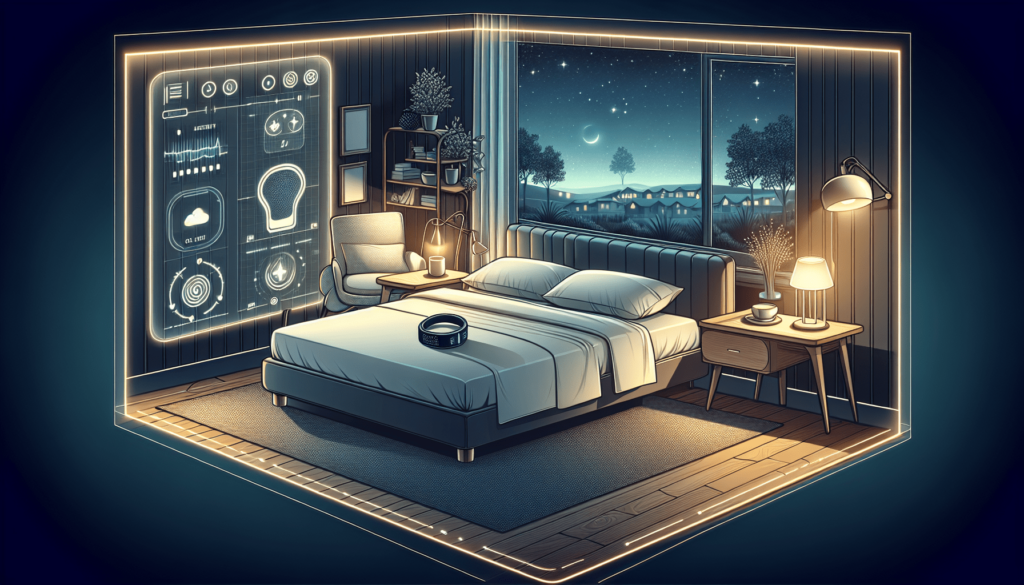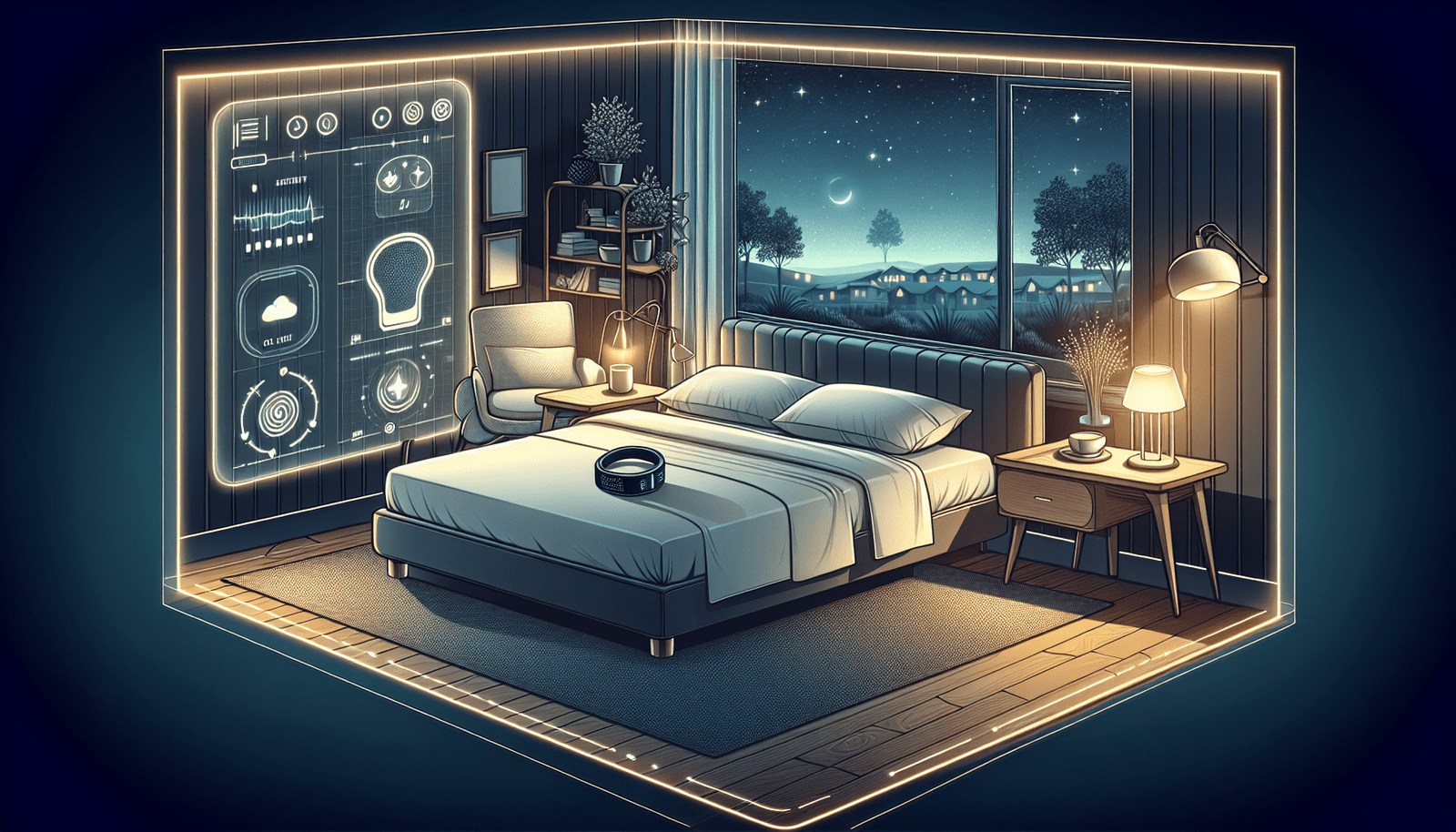Imagine a world where you can drift off to sleep peacefully, with the help of technology. No, this doesn’t mean staring at screens until the early hours; it means utilizing innovative gadgets and apps designed to enhance your sleep quality. From smart beds that adjust to your preferred sleeping position to sleep-tracking devices that analyze your patterns, technology has the potential to revolutionize the way we sleep. In this article, we’ll explore the various ways technology can help improve sleep and provide you with a much-needed restful slumber.

Sleep tracking devices
Wearable sleep trackers
Wearable sleep trackers have become increasingly popular in recent years, as they offer individuals the ability to monitor their sleep patterns and gain valuable insights into their quality of sleep. These devices, often worn on the wrist like a watch, utilize sensors to track data such as heart rate, movement, and even the stages of sleep. By analyzing this data, wearable sleep trackers can provide users with detailed reports on their sleep duration, efficiency, and even the presence of any sleep disturbances. This information can be incredibly beneficial in identifying and addressing any potential sleep issues.
Smartphone sleep tracking apps
For those who prefer not to invest in a dedicated wearable device, smartphone sleep tracking apps offer a convenient alternative. These apps utilize the built-in sensors found in most modern smartphones to collect data while you sleep, such as movement and ambient noise levels. Some apps even incorporate advanced features like sleep stage tracking through the use of the microphone and accelerometer. By simply placing your smartphone near you while you sleep, these apps can provide insights into your sleep patterns and help you identify areas for improvement.
Bedside sleep monitors
Bedside sleep monitors are another technology that can help individuals gain a better understanding of their sleep quality. These devices, often placed under the mattress or attached to the bed frame, utilize sensors to track metrics such as heart rate, breathing patterns, and movement throughout the night. By collecting this data and providing comprehensive sleep reports, bedside sleep monitors offer users the ability to make informed decisions regarding their sleep habits and potential adjustments that may enhance their sleep.
Sleep-inducing gadgets
White noise machines
White noise machines are a popular sleep aid that can promote relaxation and mask unwanted background noises that may disrupt sleep. These devices produce a consistent sound that mimics the sound of rushing air or a gentle waterfall, creating a soothing environment conducive to sleep. Many white noise machines also offer adjustable volume and sound options, allowing individuals to customize their sleep environment to their preferences.
Smart beds
Smart beds take sleep-enhancing technology to the next level, offering features such as adjustable firmness, temperature control, and even built-in massage functions. These beds utilize sensors to monitor sleep quality and make real-time adjustments to optimize comfort and promote better sleep. Some smart beds also offer features like snore detection, which can raise the head of the bed to alleviate snoring and improve breathing during sleep.
Smart mattress toppers
If investing in a new smart bed isn’t within your budget, smart mattress toppers can be an affordable alternative. These toppers can be placed on top of your existing mattress and offer features such as temperature regulation, adjustable firmness, and even sleep tracking capabilities. By simply adding a smart mattress topper, you can upgrade your sleep environment and gain valuable insights into your sleep quality without the need for a complete bed replacement.
Smart lighting
Sleep-enhancing light bulbs
Sleep-enhancing light bulbs are designed to mimic natural light patterns and promote healthy sleep-wake cycles. These bulbs emit a warm and dim light in the evening, helping to signal to your body that it is time to wind down and prepare for sleep. Some sleep-enhancing light bulbs also offer adjustable color temperatures, allowing you to choose a warm, relaxing light for your nighttime routine.
Smart light alarms
Smart light alarms, also known as wake-up lights, utilize gradually increasing light to mimic a natural sunrise and wake you up gently. These alarms simulate the rising sun by gradually brightening the room, providing a more peaceful and natural wake-up experience compared to traditional alarm clocks. By syncing with your sleep schedule, smart light alarms can help regulate your body’s internal clock and promote a more balanced sleep-wake cycle.
Night mode on electronic devices
Electronic devices emit blue light that can interfere with the production of melatonin, a hormone that promotes sleep. Night mode, available on many smartphones, tablets, and computers, reduces the amount of blue light emitted by these devices during the evening hours. By enabling night mode, you can minimize the impact of blue light on your sleep patterns and create a more sleep-friendly environment.

Sleep aid apps
Sound relaxation apps
Sound relaxation apps offer a wide variety of soothing sounds and white noise options to help mask background noises and induce a state of relaxation. From gentle rain to ocean waves, these apps provide a range of calming sounds that can promote a more serene sleep environment. Many sound relaxation apps also offer features like timers and adjustable volume levels, allowing you to customize your sleep experience.
Guided meditation apps
Guided meditation apps can be a valuable tool in achieving a peaceful and restful night’s sleep. These apps provide guided meditation sessions that focus on relaxation and mindfulness techniques. By practicing meditation before bed, individuals can reduce stress, quiet the mind, and prepare both the body and mind for sleep. Guided meditation apps often include features like sleep stories or soothing music to further enhance the sleep-inducing effects.
Sleep music apps
Sleep music apps offer a wide selection of calming melodies and instrumental compositions designed to promote relaxation and improve sleep quality. These apps typically provide playlists or soundscapes that are scientifically crafted to induce a state of tranquility and deep relaxation. Sleep music apps often incorporate features like adjustable volume, timers, and even lullabies for infants and young children.
Blue light filters
Screen filters for electronic devices
Screen filters for electronic devices are physical overlays or software applications that reduce the amount of blue light emitted by screens. By placing a filter over your device’s screen or enabling a software filter, you can effectively reduce the exposure to blue light and minimize its impact on your sleep. Screen filters are especially useful for individuals who use electronic devices close to bedtime, allowing for a more restful and uninterrupted sleep.
Glasses with blue light blocking lenses
Wearing glasses with blue light blocking lenses can help protect your eyes from the harmful effects of blue light emitted by electronic devices. These lenses work by filtering out a specific range of blue light wavelengths, reducing eye strain and improving sleep quality. Blue light blocking glasses are particularly beneficial for those who spend extended periods in front of screens, allowing for improved visual comfort and better sleep patterns.
Night mode on electronic devices
In addition to enabling night mode on your electronic devices, many devices also offer personalized settings that allow you to further adjust the color temperature and brightness. By customizing these settings to your preferences, you can create a more comfortable viewing experience that minimizes the impact of blue light on your sleep.
Smart thermostats
Temperature regulation for optimal sleep condition
Maintaining an optimal sleep environment includes controlling the temperature of your bedroom. Smart thermostats offer the ability to program and adjust the temperature according to your sleep schedule. By setting a cooler temperature during the night and a slightly higher temperature in the morning, you can create a comfortable and conducive sleep environment that promotes deeper, more restful sleep.
Programmable sleep schedules
Many smart thermostats also offer the option to create programmable sleep schedules. These schedules allow you to set specific temperature changes throughout the night to align with your sleep stages. By adjusting the temperature based on your sleep cycle, you can maximize sleep efficiency and improve overall sleep quality.
Smart climate control systems
For individuals looking for a more comprehensive sleep environment control, smart climate control systems offer a range of features beyond temperature regulation. These systems can monitor factors such as humidity and air quality and make real-time adjustments to create an ideal sleep environment. Smart climate control systems often integrate with other smart home devices, allowing for a seamless and customized sleep routine.
Smart alarm clocks
Sleep stage alarm clocks
Sleep stage alarm clocks utilize sleep tracking technology to wake you up at the optimal point in your sleep cycle. By monitoring your sleep patterns and recognizing when you are in a lighter stage of sleep, these alarm clocks can wake you up during a natural waking period, resulting in a more refreshed and energized start to your day. Sleep stage alarm clocks typically use gentle sounds or vibrations to awaken you, minimizing the abruptness of traditional alarm clocks.
Gradual wake-up lights
Similar to smart light alarms, gradual wake-up lights offer a gentler and more natural way to wake up in the morning. These alarm clocks use gradually increasing light intensity to mimic a sunrise and signal your body to wake up gradually. By simulating the dawn, gradual wake-up lights can help regulate your circadian rhythm and ease the transition from sleep to wakefulness.
Alarm clocks with soothing sounds
Some individuals find that waking up to the sound of soothing melodies or natural sounds can significantly improve their morning routine. Alarm clocks with built-in soothing sounds offer a range of options, from gentle music to sounds of nature, to ease the transition from sleep to wakefulness. By awakening to a peaceful and calming sound, you can start your day on a positive and relaxed note.
Smart home automation
Automated curtains for light control
Automated curtains offer a convenient way to adjust the amount of natural light entering your bedroom. By programming your curtains to open slowly in the morning, you can mimic the rising sun and begin your day with natural light. Similarly, in the evening, automated curtains can be set to close gradually, reducing the exposure to artificial light and signaling your body to prepare for sleep. By automating your curtains, you can create a sleep-friendly environment that aligns with your sleep-wake cycle.
Home assistant integration for personalized sleep routines
Home assistant devices, such as Amazon Alexa or Google Home, can be integrated with various smart home devices and create personalized sleep routines. By connecting your sleep tracking devices, smart lights, thermostats, and more to your home assistant, you can create a seamless and personalized sleep routine. For example, you can program your home assistant to dim the lights, play relaxing music, and adjust the temperature to optimal sleeping conditions as you wind down for the night.
Smart home devices to create a sleep-friendly environment
Beyond curtains and home assistants, there is a range of other smart home devices that can contribute to a sleep-friendly environment. From smart plugs that control electronics to smart air purifiers that enhance air quality, these devices can integrate with your overall sleep routine. By automating various aspects of your bedroom, you can create a personalized and optimized sleep environment that promotes restful sleep.
Relaxation and sleep-enhancing wearable technology
Sleep-inducing wearables
Sleep-inducing wearables are devices that utilize advanced technology to promote relaxation and improve sleep quality. These wearables often incorporate features such as gentle vibrations, breathing exercises, or even guided meditation sessions. By wearing these devices before bed, individuals can reduce stress, relax the body and mind, and facilitate a smooth transition into sleep.
Respiratory rate monitors
Respiratory rate monitors are wearables that track your breathing patterns throughout the night. By detecting changes in your breathing rate and pattern, these monitors can provide insights into the quality of your sleep and potentially detect sleep apnea or other breathing disorders. By identifying any irregularities, respiratory rate monitors can help individuals seek appropriate treatment and improve their sleep quality.
Sleep posture correcting devices
Sleep posture correcting devices are wearables that aim to improve sleeping positions and alignment. These devices often take the form of belts, vests, or pillows and provide gentle reminders or vibrations when individuals assume incorrect sleeping postures. By promoting proper alignment of the spine and reducing pressure on certain areas, sleep posture correcting devices can alleviate discomfort and improve overall sleep quality.
Cognitive behavioral therapy apps
Apps for sleep improvement through therapy techniques
Cognitive behavioral therapy (CBT) is a proven technique for treating insomnia and improving sleep quality. With the rise of mobile apps, CBT for sleep is becoming more accessible. These apps offer a range of CBT techniques, including sleep restriction, relaxation exercises, and sleep hygiene education. By engaging with CBT apps, individuals can develop healthy sleep habits, address underlying causes of poor sleep, and ultimately improve their overall sleep quality.
Sleep diary apps for tracking habits
Sleep diary apps provide a simple yet effective way to track and analyze your sleep habits. These apps allow you to record various factors such as bedtime, wake-up time, sleep duration, and any relevant sleep disturbances. By maintaining a sleep diary, individuals can identify patterns or triggers that may impact their sleep quality and make necessary adjustments.
Online sleep coaching platforms
Online sleep coaching platforms offer a comprehensive approach to improving sleep through personalized guidance and support. These platforms typically combine elements of sleep tracking, cognitive behavioral therapy, and access to sleep experts. By utilizing these platforms, individuals can receive tailored recommendations, track progress, and obtain expert advice to address specific sleep concerns. Online sleep coaching platforms can be a valuable resource for those seeking a more in-depth and personalized approach to improving sleep.
In conclusion, technology has rapidly evolved to offer a wide range of sleep-enhancing devices, apps, and tools. From wearable sleep trackers to smart lighting and home automation, these innovations provide individuals with the ability to monitor, optimize, and enhance their sleep quality. Whether you struggle with falling asleep, staying asleep, or simply want to optimize your sleep environment, there is undoubtedly a technological solution available to help improve your sleep. By harnessing the power of technology and incorporating it into your sleep routine, you can work towards achieving a more restful and rejuvenating night’s sleep.
